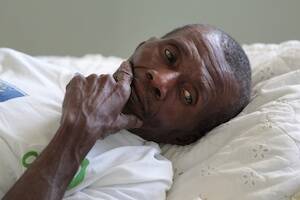A cholera epidemic that erupted in earthquake-shattered Haiti entered its second year on Oct. 19 as aid agencies promoted a new weapon to battle the deadly water-borne disease. Through Oct. 9 of this year, 469,967 cases of the disease have been reported, leading to 6,595 deaths, now the world’s largest cholera outbreak. Led by the Boston-based Partners in Health, aid agencies plan a vaccination program that could reduce the incidence of cholera and prevent the rapidly transmitted illness from overrunning vulnerable communities. Partners in Health is targeting Haitians in isolated rural villages and those still living in tent camps without access to clean water in quake-devastated Port-au-Prince. It estimates that only about 54 percent of all Haitians have access to clean water. The agency hopes to inoculate more than 100,000 people beginning in January. “What we’re proposing is not a trial,” said Paul Farmer, who co-founded Partners in Health. “The vaccine has been proven safe. It’s yet another effective measure against this epidemic.” The problem, he said, is raising $300,000 to fund the campaign, because the world has moved on to other concerns.
Cholera Persists in Haiti
Show Comments (
)
Comments are automatically closed two weeks after an article's initial publication. See our comments policy for more.
The latest from america
Perhaps it is the hard-won wisdom that comes with age, but the Catholic rituals and practices I once scorned are the same rituals and practices that now usher me into God's presence, time and time again.
"Only through patient and inclusive dialogue" can "a just and lasting conflict resolution can be achieved" in the long-running conflict between Israelis and Palestinians, said the Holy See's permanent observer to the United Nations.
The ”Bad Guys” films ask, how do we determine who the “bad guys” are? And if you’re marked as “bad” from the start, can you ever make good?
In these dark times, surrounded by death and destruction in Gaza, we hear the command in the first reading, “Choose life.” What are the ways we can do this in a world that seems to have gone mad?








